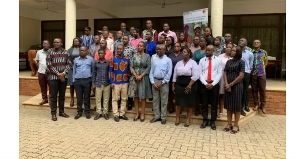A study conducted by the Partnership for African Social and Governance Research (PASGR) in Ghana has revealed that limited financial resources and a lack of social and political connections are significant obstacles for the country’s youth in achieving their economic goals.
The study is dubbed “Economic Aspirations of Ghanaian Youth: Implications for Youth Employment Policies and Programmes in the Post-COVID-19 Era.”
It was carried out from March 2021 to December 2023 and was replicated in Kenya, Senegal, Ethiopia, Uganda, and Nigeria.
The key objective of the study was to ascertain the aspirations, resilience, and strategies of African youth amid challenging circumstances such as policy limitations and the COVID-19 pandemic.
The researchers identified three primary economic aspirations among Ghanaian and African youth: the desire to establish their own businesses, pursue a combination of formal employment and entrepreneurship and accumulate wealth.
Of the 1,639 young men and women surveyed nationwide, 60.2% of them expressed interest in venturing into business ownership.
Gender disparities were observed in preferred business sectors, with young men gravitating towards agriculture-related ventures and trade, while young women showed interest in traditionally female-dominated fields like beauty services and household trade.
According to the study, approximately 25.7% of respondents expressed a desire to blend formal employment with entrepreneurial pursuits, citing the attractiveness of well-paid and prestigious professions such as computer science, engineering, and medicine.
Wealth accumulation emerged as another key aspiration among Ghanaian youth, driven not solely by personal ambitions but also by a desire to support their families.
It further identified significant barriers hindering youth economic aspirations, notably a lack of financial capital and political and social connections.
The majority of participants highlighted the absence of starting capital as a major challenge, emphasising the critical role of financial resources in realizing entrepreneurial dreams.
Several other respondents underscored the importance of political and social networks in accessing employment opportunities and government support programs for entrepreneurs.
The Mastercard Foundation’s Country Director, Rosy Fynn, speaking at the launch of the study said “This study shows that young people have multifaceted aspirations that we need to consider in our work to enable young women and men access dignified and fulfilling work,” she said.
On his part, the African Youth Resilience and Aspirations Project Coordinator, Joel Otieno, added that the study will help inform policymakers and youth empowerment organizations.
“It is how can we then create enough opportunities or provide enough incentives for young people to own their own businesses and ventures. In a way of improving their livelihoods and well-being and this is important as a policy recommendation.
“Other policy recommendations are to find opportunities for supporting young people financially in accessing financial capital, building their own opportunities in terms of how the business environment is favouring them and also other avenues in which young people can be supported and mentored,” he said.
General News of Monday, 25 March 2024
Source: rainbowradioonline.com
Lack of political, social connections limiting economic aspiration among youth – New study discloses
Entertainment












